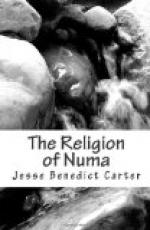In the older purer age of Greece the gods were never far away from men, they lived almost side by side with them; there were to be sure many gods of whom they were afraid and from whom they desired to keep as far away as possible, but there were a great many other gods of whom they liked to think. In constructing the records of their history they did not work backwards from the light of the present into an ever darkening past, but they began from the beginning in the full light of the gods from whom all things sprang, and mythology passed into history by imperceptible gradations. They knew more about the beginning when all things were completely in the hands of the gods than they did about their immediate past. Art began very early to make them familiar with the appearance of the gods, so that there was little that was mysterious about their religion, so little that the element of mystery had later to be almost artificially cultivated in the “mysteries.” They respected the gods rather than feared them, and they felt that the gods would do them no harm unless they themselves first sinned against them or their own fellow-men, and the oracles of Delphi were no more terrifying to them than the coming of the word of God was to the prophets of Israel. They were accustomed to these messages, which were almost every-day affairs. It was all a part of that marvellous poise of nature which made the every-day mortal Greek almost as calm as the unperturbed imperturbable faces of their gods as their great sculptors saw them.
In Rome all was very different. The superstitious element in the Italian character, which amazes us so much to-day when cultured twentieth century men and women in good society persecute their fellows because of the evil eye, is a heritage of many thousand years. Sometimes it seems as if it were the Italian birthright, the blight of Etruria which came into their nature in spite of themselves. It required centuries to educate the Roman into the concept of personal individual gods. He had begun his theological career by terror of unknown powers all about him, and by regarding religion as the science of propitiating the right power on the right occasion. One could not know these powers, one did not desire to. Their gods were at once their masters and their servants, but never their companions. The early Roman knew no such thing as an oracle, the only messages from the gods were the expressions of their wrath, in the sending of prodigies and portents. They did indeed consult the gods by watching the flight of birds or studying the entrails of the sacrifice, but it was merely to obtain a “yes or no” answer to a categorical question as to whether a certain act was pleasing to the gods. Otherwise all about them lay mystery, and at the point where sight failed, since neither imagination nor faith carried them any further, superstition stepped in, and the more they thought of the gods the more terrified they became. Now if you present to a people thus constituted a




